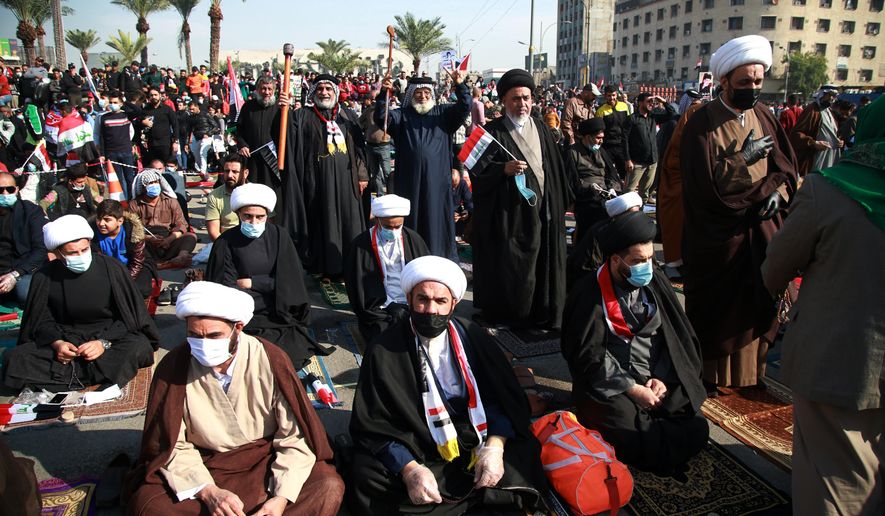BAGHDAD (AP) - Confrontations between demonstrators and followers of a firebrand cleric left two protesters dead in southern Iraq on Friday, officials said, as thousands also took to Baghdad’s streets in a show of support for the preacher ahead of elections next year.
Two protesters were killed and 10 were wounded in the southern city of Nasiriya, two medical officials said, after clashes broke out between anti-government protesters and supporters of Moqtada al-Sadr. The officials spoke on condition of anonymity in line with regulations.
Al-Sadr leads a powerful political bloc and his supporters had called for a demonstration in support of the leader’s call for mass participation in next year’s vote. Anti-government protesters feel betrayed by al-Sadr’s flip-flop approach toward them, especially in the last few months when he withdrew support for their movement.
Clashes broke out in Nasiriya when anti-government protesters camped out in Haboubi Square stood in the way of al-Sadr’s followers as they attempted to march toward a central bridge. Al-Sadr’s followers fired live rounds that killed two protesters, the official said.
The violence occurred hours after supporters of al-Sadr congregated in Baghdad’s Tahrir Square, once the epicenter of mass anti-government protests, to show their support for for the cleric ahead of federal elections slated for next June.
Al-Sadr’s followers stood unmasked in the square, chanting: “Yes, yes for our leader,” in support of the firebrand cleric as Iraq remains a high-risk country for coronavirus infection. The crowd then stood side-by-side for Friday prayers at noon.
More than 12,000 people have died of the virus in Iraq amid 544,000 confirmed cases, according to Health Ministry figures. Daily infection rates average 2,400 cases per day, but health workers say the number may be higher as many Iraqis with symptoms choose to stay home and avoid hospitals to get tested.
Iraq has the second highest outbreak and number of deaths in the region after Iran.
Al-Sadr leads the Sairoon political bloc, which holds the majority in parliament. He has taken steps in preparation for elections scheduled for June next year. His followers called for a demonstration in support of the leader’s call for mass participation in the vote.
“The Iraqi people and al-Sadr’s followers will have one saying, and that is: Yes yes for Iraq,” said Ibrahim al-Jabiri, director of al-Sadr’s office north of Baghdad.
Observers consider the protest as a show of mettle by al-Sadr meant to send a message to other political blocs that on Iraq’s streets, the cleric still has clout.
Prime Minister Mustafa al-Kadhimi called for elections to take place next June, a year earlier than expected. That was a key demand of anti-government protesters who paralyzed Iraq’s streets when tens of thousands demonstrated last October.
The elections will take place under a new law approved by lawmakers this year that theoretically will enable more independent candidates to run. Iraq’s electoral commission has said it is prepared to hold early elections on time if the government allocates a budget for the vote.




Please read our comment policy before commenting.